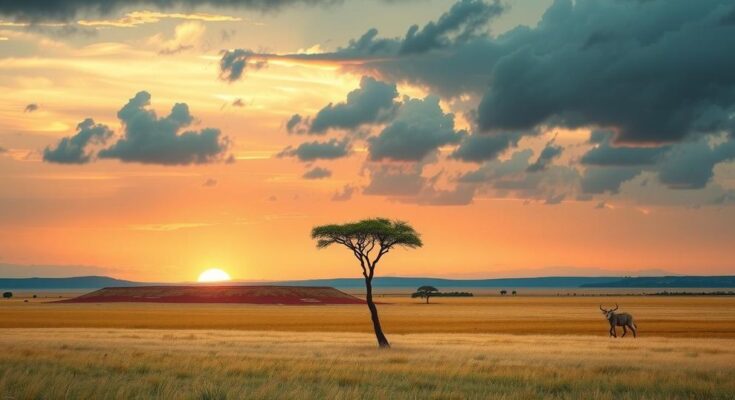Southern Africa is currently experiencing a severe drought, impacting over 61 million individuals. Countries such as Namibia are declaring states of emergency, with significant food insecurity affecting the population. Climate change is the primary cause of the drought, which compounds the increasing frequency of natural disasters worldwide. Collaborative efforts are critical to address climate change effectively.
Currently, Southern Africa is enduring one of its most severe droughts in over a century, affecting approximately 61 million individuals, with over 20 million in critical conditions. Countries including Botswana, Namibia, Lesotho, Malawi, Zambia, and Zimbabwe have declared states of emergency due to the dire circumstances of this drought. In Namibia, the situation is particularly severe, with an estimated 40% of the population experiencing acute food insecurity.
In response to the extreme hunger, Namibia has initiated a culling of around 700 wildlife, including elephants, hippos, and elands, aimed at alleviating food shortages. As of 2024, 84% of Namibia’s food reserves are depleted, further complicating the crisis. This is not a new predicament for Namibia, which has experienced similar states of emergency for drought in previous years.
The drought’s severe impact is attributed to climate change, similar to environmental disasters currently occurring worldwide, such as the wildfires in California. Historical data indicates a notable rise in natural disasters related to climate change over the last two decades, underscoring the urgent need for attention to this issue. This trend signifies a growing global concern as the frequency and intensity of such disasters increase.
The significance of addressing climate change extends beyond the immediate crisis zones, impacting global communities in various ways. Individuals may question the effectiveness of their efforts, believing that their contributions may seem insignificant. However, collective action by a substantial number of people can definitely drive change, and immediate action is essential to mitigate further repercussions of climate change.
In conclusion, the ongoing environmental crises highlight an urgent need for action against climate change. Southern Africa’s drought situation serves as a compelling reminder of the ramifications of climate inaction, urging efforts to combat these global challenges. Recognizing the interconnectedness of our world is essential to fostering a proactive approach towards sustainability and environmental preservation.
In summary, the severe drought in Southern Africa emphasizes the urgent need for effective climate action. Over 61 million people are impacted, with many facing acute food insecurity. Historical patterns indicate recurring drought emergencies in Namibia, directly tied to climate change, which worsens the frequency and intensity of natural disasters. Collective action is essential to combat climate change for current and future generations.
Original Source: www.theteenmagazine.com




